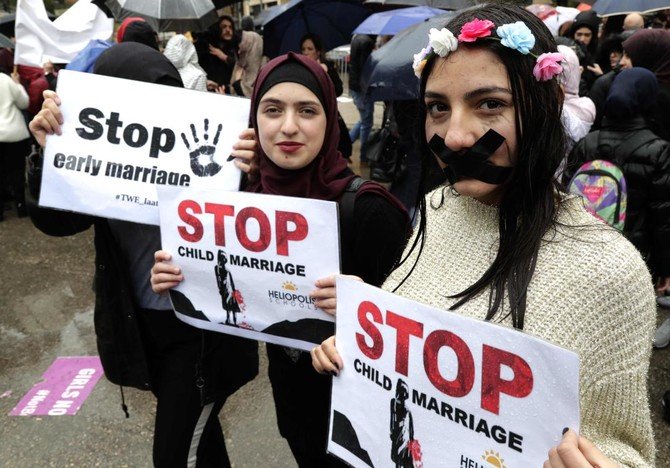
- ARAB NEWS
- 14 Jul 2025

Last month was a remarkable one for Saudi Arabia, as the country made headlines in almost every newspaper around the world. On Dec. 23, the Kingdom announced the court decision on the infamous Jamal Khashoggi murder case, sentencing five people to death. Only a few days before, the country was making waves of a different kind as the region’s biggest festival, MDL Beast, took place over three days. Some 400,000 people from across the globe flocked to the electronic music festival. Everyone from Armie Hammer to David Guetta and Alessandra Ambrosio were invited to be part of this historic moment, calling it a major cultural shift.
However, one story fell through the cracks in December and did not get much traction outside the Kingdom. This was Saudi Arabia’s decision to ban marriages for people under the age of 18. The decision by the Ministry of Justice was the latest in a string of moves to improve the rights of women in the country. Earlier last year, the government banned marriages for children under the age of 15. Prior to that decision, there was no age limits on marriage for boys or girls.
For any country, this would be monumental. For a conservative country, it was historic.
The decision was particularly significant because child marriage is still widespread. According to the International Center for Research on Women, a third of girls in the developing world are married before the age of 18 and one in nine before the age of 15. Alarmingly, 117 countries around the world still allowed child marriages as of August last year, according to the World Economic Forum.
In the US, for example, child marriage is legal. Because laws governing marriages are regulated at a state level, 48 states have some sort of loophole that allows children under the age of 18 to marry. Only in 2018 did Delaware and New Jersey make it illegal for anyone under the age of 18 to get married. Perhaps the US is not the best example for radical social change, but even Norway, the country that was ranked as the fourth-best place to live if you are a woman, only banned child marriages in 2018.
While many would argue that Saudi Arabia’s ban also has loopholes — teenagers under the age of 18 can still get married if they are granted approval by a special court — we need to examine the decision in the country’s very specific context.
Saudi Arabia is a conservative country, with deep historical, religious and cultural roots. It is the custodian of the two holy mosques. Early marriage is enshrined in religious scriptures, as many claim that it follows the strict interpretation of Shariah that allows girls to marry as soon as they reach puberty.
Despite last month’s decision by the government, the issue is still being debated. In fact, the debate has reverberated across the region, bringing the issue of child marriage to the forefront in both the religious and cultural spheres.
This decision was also not made in isolation. It followed several notable changes in the Kingdom, including allowing women to travel and obtain a passport without the permission of their male guardians. Women are now also allowed to register the birth of their child and apply for marriage or divorce.
Child marriage remains a global concern. It cuts across geographical borders, religions, cultures and class systems. It is a means for many to get out of poverty, to chastize their children, or to cover up for a rape or an illegal pregnancy.
The decision has brought the issue of child marriage to the forefront in both the religious and cultural spheres.
Asma I. Abdulmalik
Saudi Arabia’s move was by no means an easy feat. It was bold and righteous. It also came after a long and persistent campaign, championed by the Ministry of Justice, and dating back to 2014, when it reported the negative psychological effects of early marriages on girls. If anything, that demonstrates the Kingdom’s efforts to expand the rights of women and their freedoms. It sets an example for the rest of the world that change, although contextually radical, can still be done. It gives other countries that rank far higher on the gender equality scale no excuse but to follow suit.
This is not just a step in the right direction, as most critics describe it, but a leap forward for this Muslim country. It validates Crown Prince Mohammed bin Salman’s bold plans to modernize the Kingdom and make new laws that will guarantee the rights of women and children.
This is why the decision by the Kingdom was historic.
Asma I. Abdulmalik is an Emirati civil servant and a writer interested in gender and development issues. Twitter: @Asmaimalik